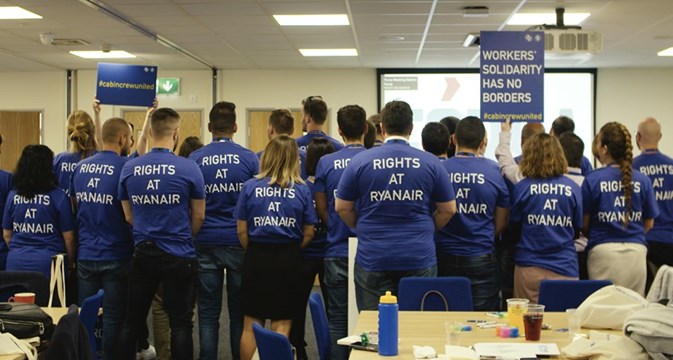
As one of the largest airlines in Europe, you would expect Ryanair to have a fairly good understanding of the myriad rules that govern the aviation industry across the continent. For an airline that is currently battling industrial strife, with the threat of strikes by both pilots and cabin crew, you’d think Ryanair would be especially careful about the rules for flight crew.
Unfortunately, it looks like that might not be the case – at least, if a memo allegedly sent by Andrea Doolan, the airline’s Head of Inflight Operations on the 11th July to Ryanair’s cabin crew is to be believed. The memo was leaked by the Spanish USO union who have written to Ryanair in an attempt to point out what the actual rules are.
Doolan says that over the last few weeks, a number of cabin crew have refused to complete their duty day. She says that has resulted in flights being delayed or cancelled, aircraft being left out of position and “unacceptable delays and inconvenience for our passengers.”
Doolan says cabin crew are doing this because they are under the “uninformed assumption that they have ‘discretion’.” The memo goes onto say:
“This behaviour is unacceptable and cannot be tolerated. Cabin crew do not have “discretion” under the Ops (Operations) manual to decide what flights they are going to operate. On the rare occasion where there is an issue of operating into discretion, the commander makes that decision for all the crew.”
“The commander of the aircraft is the only person who can exercise discretion.”

This whole situation is all a little confusing but luckily, the rules are actually set by the European Air Safety Authority, otherwise known as EASA. Under the comprehensive, Flight Time Limitation (FTL) rules, aircraft commanders really do have the authority to extend the maximum period that crew are expected to work…
We all know that cabin crew are only allowed to work for a certain number of hours. It’s part of a regulatory strategy to make sure crew are alert and fit should they have to deal with an emergency situation. But… an aircraft Commander (that’s the Captain to you and me) can extend those hours under specific circumstances (like a significant delay for example).
However, while the final decision rests with the Captain, they have to consult all the crew and they also have to take into consideration a number of factors including the condition of crew members. The general rule is that a Captain can only extend the duty period of cabin crew if it won’t affect flight safety.
But what if a crew member says they are too tired to continue? Ryanair is operating one of its busiest ever summer schedules and the airline hasn’t been shy in publishing the many delays its experienced due to Air Traffic Control problems. Crew members are working 5-day’s in a row, up to and over 12-hours at a time.
According to ICAO, fatigue means a “physiological state of reduced mental or physical performance capability resulting from sleep loss or extended wakefulness, circadian phase, or workload (mental and/or physical activity) that can impair a crew member’s alertness and ability to safely operate an aircraft or perform safety-related duties.”
If a crew member is feeling fatigued and believes that flight safety could be jeopardised it’s actually a legal requirement for them to refuse to operate the flight.
The USO union has said it is “concerned” with Ryanair’s apparent “lack of knowledge of the rules”. The union says it has informed the European regulator and is calling on Ryanair to change its “aggressive” HR policy.
“Positive messages will get better results than threats,” the unions writes in its letter to Ryanair. “We would like to believe that Ryanair does not want exhausted crew taking care of 189 passengers.”
Mateusz Maszczynski honed his skills as an international flight attendant at the most prominent airline in the Middle East and has been flying ever since... most recently for a well known European airline. Matt is passionate about the aviation industry and has become an expert in passenger experience and human-centric stories. Always keeping an ear close to the ground, Matt's industry insights, analysis and news coverage is frequently relied upon by some of the biggest names in journalism.







